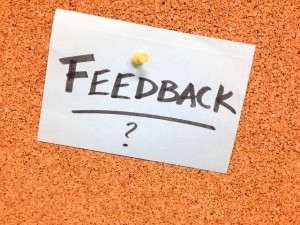 Feedback is always necessary no matter the project or situation, but there’s an important and often overlooked next step: what happens after the feedback?
Feedback is always necessary no matter the project or situation, but there’s an important and often overlooked next step: what happens after the feedback?
This point is brought home in a recent Harvard Business Review article, “Feedback Without Measurement Won’t Do Any Good,” in which MIT Research Fellow and author Michael Schrage writes: “People understandably invest significant time and care trying to get better at giving feedback that matters. Unfortunately, those investments typically underperform. The reasons are simple and obvious: The true purpose of better feedback is not to improve receptivity or enhance understanding but to effect measurable change.”
Thus for feedback to really “matter” everyone involved in the process should understand that it is a means to an end. As Schrage says, “No matter how charmingly or charismatically delivered, feedback that doesn’t lead to better outcomes fails.”
This is where metrics—yes metrics!—play a vital role. Metrics turn feedback from well-intentioned advice into a process for measuring changes as a result of the feedback.
Schrage says the future of feedback “requires embracing the quantified self.” We already have the ability to digitally, visually and thoroughly self-monitor ourselves at the personal level, so the next step is to apply “self-quantification” in the business environment, which sounds to me like a much more comprehensive—and perhaps uncomfortable—type of performance review.
“Today’s self-quantifiers count calories and steps and time spent,” Schrage says. “Tomorrow’s will be tracking what their bosses, collaborators and — yes — customers and clients want them to improve professionally. Serious feedback will come with self-quantification attached.”
To some this may sound a bit like something out of 1984 or Brave New World, and Schrage acknowledges the feedback/self-quantification loop he posits comes with a certain amount of controversy attached. “The critical and controversial challenge, of course, revolves around consent…It’s one thing to have a superior, colleague, or client offer constructive criticism; it’s quite another when professional critiques come with apps designed to monitor one’s efforts to improve.” These apps might include email “sentiment analysis” and “promptware” to help you manage scheduling and follow-ups if the feedback says you’re mismanaging your schedule.
Bottom line: actions and data speak louder than just words, especially with feedback.
I’d love your opinions. Does this make professional sense and is the wave of the future? Or do you find it off-putting?
Image: Got Feedback? Alan Levine/Flickr CC